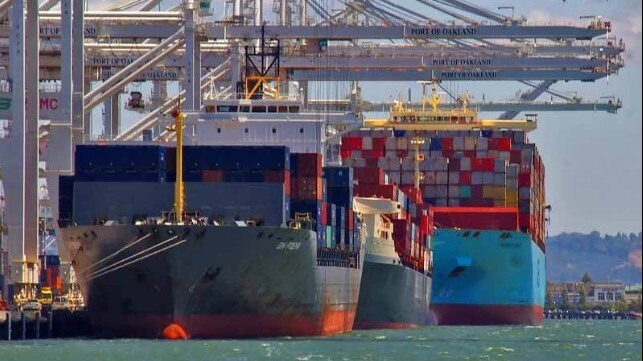Legislation Proposes Port Priority for Ships Carrying U.S. Exports

Looking to expand the emphasis on export shipping from U.S. ports, three members of the U.S. House of Representatives from California proposed new legislation that would require U.S. ports to emphasize exports by giving priority to carriers that demonstrate their predominance of export bookings versus carrying empty containers or departing with unused capacity. While clearing the way for the Ocean Shipping Reform Act of 2022 to become law last month by accepting the Senate version of the legislation, members of the U.S. House said they would seek additional legislation addressing points removed from the bill emphasizing exports.
“Foreign exporters’ access to the American market and our consumers is a privilege, not a right. Cargo ships looking to offload foreign-made products and profit off West Coast ports must provide opportunities for American exports in return,” said Congressmen John Garamendi, one of the co-sponsors of the bill. Representatives Jim Costa and Mike Thompson joined in introducing the American Port Access Privileges Act.
According to the co-sponsors of the legislation, the American Port Access Privileges Act would ensure fair trade for U.S. businesses and keep hard-won foreign markets accessible to California’s agricultural growers as well as other exporters.
The bill calls for establishing a secondary berthing preference for ocean-going commercial vessels servicing multiple ports in the United States or with significant cargo bookings of American exports. Priority they write should continue to be with the U.S. military as well as Jones Act, and other US-flagged vessels and the bill also seeks to codify the current preferences in place at many major American ports for these segments. However, after those vessels, ships carrying exports should be prioritized.
“Our legislation would put American exports at the front of the line at our ports to support American businesses and workers. Congress must restore fairness at our ports for American exporters to help reduce the United States’ longstanding trade imbalance with countries like China,” said Garamendi.
To receive the port priorities, vessels would have to document that they have cargo booking for exports totaling either 51 percent of the vessel’s carrying capacity by weight or 51 percent of the vessel’s TEU capacity that would be loaded before calling at a foreign port. The cargo could be loaded in single or multiple U.S. ports, but foreign vessels calling at more than one U.S. port before departing for international ports would also be eligible for the priority berthing in U.S. ports.
"Supply chain disruptions are hurting California farmers and exporters like never before," said Costa. "We need to remove bottlenecks and mitigate congestion at our ports to carry out American exports.”

that matters most
Get the latest maritime news delivered to your inbox daily.
Not later than 90 days after the passage of the legislation, the Secretary of Transportation would be required to issue the definitions of preferential berthing. The U.S. Department of Transportation’s Bureau of Transportation Statistics would also be required to collect data on berthing and cargo practices at U.S. ports to evaluate ocean carriers’ practices for port calls and cargo bookings, as well as the impact of preferential berthing afforded under the bill.
The “American Port Access Privileges Act” is endorsed by the Agriculture Transportation Coalition (AgTC), National Milk Producers Federation, and US Dairy Export Council.
